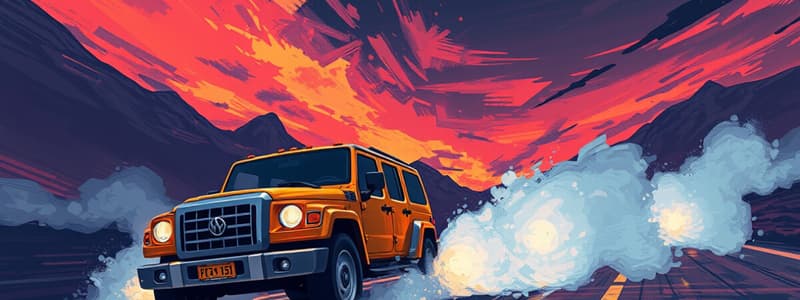Podcast
Questions and Answers
What should you not do when you experience a blowout when driving on the highway?
What should you not do when you experience a blowout when driving on the highway?
Use the brakes.
If you are under the age of 21, NJ law states that you may be under the influence of alcohol if your BAC is what %?
If you are under the age of 21, NJ law states that you may be under the influence of alcohol if your BAC is what %?
0.01 percent or higher.
What should a motorist do if they drive through a puddle?
What should a motorist do if they drive through a puddle?
Test the brakes by pumping them.
At what speed does your car begin to hydroplane?
At what speed does your car begin to hydroplane?
Why is it good practice to keep a good following cushion?
Why is it good practice to keep a good following cushion?
By law you are considered under the influence when your BAC has reached what percentage?
By law you are considered under the influence when your BAC has reached what percentage?
What should a driver increase the following distance to when traveling on wet roads?
What should a driver increase the following distance to when traveling on wet roads?
What is good practice to do when a motorist is being passed by another vehicle?
What is good practice to do when a motorist is being passed by another vehicle?
What do studies show that most people arrested for drinking and driving have been drinking?
What do studies show that most people arrested for drinking and driving have been drinking?
If your car drifts onto a dirt shoulder and you want to return to the pavement, what should you do?
If your car drifts onto a dirt shoulder and you want to return to the pavement, what should you do?
Are 12 ounces of beer, 5 ounces of wine, and 1 and 1/2 ounces of 86 proof liquor equal to each other?
Are 12 ounces of beer, 5 ounces of wine, and 1 and 1/2 ounces of 86 proof liquor equal to each other?
What can happen if a person gets drunk in your house and has a car accident after leaving your home?
What can happen if a person gets drunk in your house and has a car accident after leaving your home?
What is good practice to do if you are involved in a skid?
What is good practice to do if you are involved in a skid?
What is the only thing that can sober a person up?
What is the only thing that can sober a person up?
List several different drugs that can affect your driving skills.
List several different drugs that can affect your driving skills.
What should you increase the following distance to when traveling on snow-covered roads?
What should you increase the following distance to when traveling on snow-covered roads?
What is your risk of causing an accident if a motorist has a BAC of 0.10%?
What is your risk of causing an accident if a motorist has a BAC of 0.10%?
What does driving under the influence of intoxicating beverages mean?
What does driving under the influence of intoxicating beverages mean?
What should you do if you find yourself getting angry or excited while driving?
What should you do if you find yourself getting angry or excited while driving?
When are road surfaces most slippery?
When are road surfaces most slippery?
What should a driver do to avoid highway hypnosis?
What should a driver do to avoid highway hypnosis?
To maintain proper following distance when driving, you should stay at least how many seconds behind the vehicle in front of you?
To maintain proper following distance when driving, you should stay at least how many seconds behind the vehicle in front of you?
What is the Standard Collision Prevention Formula?
What is the Standard Collision Prevention Formula?
How many seconds ahead should you be looking when driving in the city?
How many seconds ahead should you be looking when driving in the city?
What is the best way to communicate with other drivers?
What is the best way to communicate with other drivers?
Flashcards are hidden until you start studying
Study Notes
Driving Safety Guidelines
- Firmly grasp the steering wheel and keep the vehicle straight during a blowout; gradually slow down by removing foot from gas without using brakes. Coast to a safe area.
- In New Jersey, individuals under 21 are legally considered under the influence if their Blood Alcohol Concentration (BAC) is 0.01% or higher.
- When driving through puddles, pump brakes to test and dry them; reduce speed, especially in deeper water.
- Hydroplaning can begin at speeds of 35 mph, with increased risk at 55 mph and above, potentially causing tires to completely lose contact with the road.
- Maintaining a safe following distance allows time to react to emergencies; recommended distance increases to 4 car lengths on wet roads and 6 car lengths on snow-covered roads.
- By law, a BAC of 0.08% or higher classifies a driver as under the influence.
- When being passed by another vehicle, slow down and stay in your lane to facilitate safe passage; resume normal speed once the other vehicle is ahead.
- Studies indicate that beer is the most commonly consumed alcohol among those arrested for drinking and driving.
Handling Vehicle Situations
- To regain control after drifting onto a dirt shoulder, slow down, recover control, and then turn slowly back onto the road.
- 12 ounces of beer, 5 ounces of wine, and 1.5 ounces of 86-proof liquor are equivalent in alcohol content.
- Hosts can be subject to lawsuits if a guest drives under the influence and is involved in an accident after leaving a gathering.
- In case of skidding, ease off the gas, turn in the direction of the skid, and avoid oversteering or braking until control is regained.
Intoxication and Driving Risks
- Only time can effectively sober a person; no other methods are reliable.
- Various drugs can impair driving capabilities including marijuana, prescription medications, cold pills, and tranquilizers.
- Risk of causing an accident increases six-fold when a driver has a BAC of 0.10%.
- Driving under the influence impairs judgment, coordination, reaction times, and can affect vision and distance perception.
General Driving Practices
- Stay calm and follow road rules if feeling angry or excited while driving.
- Road surfaces are most slippery during the initial minutes of rainfall.
- To combat highway hypnosis, avoid fixating on any one object for too long, take breaks every two hours, and consider sharing driving responsibilities.
- Maintain a minimum following distance of 3 seconds behind the vehicle in front; increase this to at least 4 seconds in poor weather.
- The Standard Collision Prevention Formula emphasizes being alert, prepared for unexpected situations, and able to act calmly in emergencies.
- When driving in the city, keep a lookout 12 seconds ahead to anticipate changes.
- Best practices for communicating with other drivers include using turn signals, maintaining eye contact, tapping the horn when necessary, and using high beams at night for warnings.
Studying That Suits You
Use AI to generate personalized quizzes and flashcards to suit your learning preferences.




